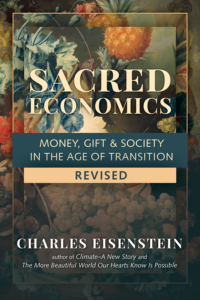Climate — A New Story
Chapters
Chapter 6: A Bargain with the Devil
The Causes of Passivity
In most of the world outside the U.S., it is not the skeptics that pose the biggest obstacle to climate action, but rather the indifference of the general public and the political class. They profess to believe, but do they really? I am writing this at my brother’s farm. What if someone came to me and said, “Hey, Charles, your four-year-old is outside wandering in that area where we saw a venomous snake!” And I said, “I believe you. I’d better do something about it and I will—as soon as I finish this game of Tetris.” You would be justified in concluding that I didn’t really believe the warning. Maybe I believed it was a milk snake we saw, not a copperhead. Maybe the person giving the warning has a history of false alarms. Whatever the reason, you could be sure I didn’t really believe it, because if I truly believed my child were in danger I would drop everything else to protect him.
A majority of the public holds the opinion that climate change is seriously threatening civilization, but do they really believe it? Perhaps they are not so different from outright climate skeptics. The skeptics match their disbelief with the opinions they profess. The ostensible believer thinks he believes, but actually does not. Come on, do you really believe it? Or is it that you have episodes of despair in which climate change seems crushingly real, while other times you profess to believe but act as if the future of humanity were not at stake? Other environmentalists have raised this question, typically following with hand-wringing about how to cut through the denial and make people believe for real. Usually the strategy to do that has been to amp up the fear. I am arguing that a frontal assault on denial (whether the psychological denial of the average citizen, or the ideological position of climate skeptics) is unnecessary and has not worked. In fact, the more hyperbolic the headlines, the less effective they are.
For the last twenty years, 93 percent of all news in the “environment” category has been focused on climate change.[2] It seems nearly every article says either “See, climate change is really happening!” or “Such-and-such a hurricane or fire or famine was caused or exacerbated by climate change.” Yet despite the crescendo of alarums, society as a whole still does not actually believe it. Quite the opposite: according to psychologist Per Espen Stoknes, “Long-term surveys show that people were more concerned with climate change in wealthy democracies 25 years ago than they are today. So the more science, the more IPCC assessments we have, the more the evidence accumulates, the less concerned the public is. To the rational mind this is a complete mystery.”[3]
Stoknes explains the mystery in his book What We Think about When We Try Not to Think about Global Warming. Because the consequences of climate change are far off in time and space, people deprioritize it in favor of more immediate issues. For most people, compared to their mortgage payment or their teenager’s addiction problem, climate change seems quite remote and theoretical—something that is only happening in the future or on the news. Even if one is intellectually persuaded of the reality and gravity of climate change, the felt reality is still “It isn’t real” or “It’s gonna be fine.” Furthermore, Stoknes says, the climate issue is usually presented in doom-and-gloom terms that make people feel powerless to do anything about it, while at the same time feeling guilty about their inaction and their complicity in the fossil fuel economy. This leads to various kinds of psychological denial to alleviate the guilt.
To Stoknes’s point about the temporal and spatial remoteness of climate change, I would add another, more insidious form of distancing. The reliance of the climate narrative on global datasets and computer models creates a gap between cause and effect that can be bridged only by trusting the pronouncements of the scientific establishment. Even for those disposed to trust science, cause and effect are more distant than they are in the case of “logging is ruining the forest” or “toxic waste is polluting the river.”
When we say that such-and-such a flood in Bangladesh or drought in Niger was worsened by climate change, people have to accept it as an article of faith, because Science Says So. Compare that to the water paradigm discussed earlier, in which the impending destruction of the wetlands of the Sahel by new dams will have devastating regional (and perhaps global) climate effects. A much shorter chain of causal argument is available here. Drain the wetlands, and the birds die, the soil bakes, the animals disappear, and the droughts intensify.
Around the world, deforestation, wetlands draining, industrial agriculture, hydroelectric dams, and urbanization make land vulnerable to catastrophic floods, droughts, and temperature extremes. All of these practices are addressable on the local level. The climate change narrative tends to make them seem inconsequential—a drop in the bucket of global emissions. It shifts attention away from the local devastation toward distant, perhaps hypothetical, effects.
The alternative frame I am proposing, focusing on local ecosystems, nullifies Stoknes’s mechanisms of denial and paralysis. It addresses tangible damage in ways that bring tangible results. People cannot see changes in atmospheric concentration of invisible, odorless gases, nor can they be directly aware of distant effects on climate, but they can see (or feel the effects of) denuded hillsides, erosion gullies, smog, toxic waste, contaminated water, and so forth. They can also see the return of songbirds, the rising of water tables, the return of fish, and the clearing of air and water pollution where pro-environmental policies are implemented.
A problem remains, however. It is not only climate change whose effects are distant from everyday life—it is ecological destruction generally. This is especially true in the developed world. So far the elite nations are able to insulate themselves from the harm that ecological destruction causes. Therefore it seems unreal. The air conditioner still runs. The car still goes. The credit card still works. The garbage truck takes away the trash. School is open at 8 a.m. and there is food in the supermarket and medicine in the pharmacy. The routines that define normal life are still intact. If we wait for catastrophes to demolish them it will be too late.
As long as normal routines continue, most people will not be persuaded to take meaningful action. Persuasion does not penetrate deeply enough. No one is ever “persuaded” to make major changes in their life’s commitments unless that persuasion is accompanied by an experience that impacts them on a physical and emotional level.
That is why, whether in the standard climate narrative or the more locally oriented ecological degradation narrative I’m proposing, we need to reach people in some other way. We need to pierce the perceptual, emotional, and systemic structures that separate people from their love for all beings of this earth.
Here is what I want everyone in the climate change movement to hear: People are not going to be frightened into caring. Scientific predictions about what will happen ten, twenty, or fifty years in the future are not going to make them care, not enough. What we need is the level of energy and commitment that we saw at Standing Rock. We need the breadth of activism we saw in Flint, Michigan, where everyone from yoga teachers to biker gangs joined in relentless protest against lead contamination. That requires making it personal. And that requires facing the reality of loss. Facing the reality of loss is called grief. There is no other way.
The Standing Rock action to stop the Dakota Access Pipeline wasn’t framed around climate change at all (at least until white environmentalists became involved) but around protecting water and the integrity of indigenous sites, and not all water or all sites, but a specific body of water and specific sites, real places. Thousands of people, especially young people, braved long journeys and hostile conditions to participate. That is the kind of commitment we need to arouse in defense of the sacred, in defense of all beings of earth. It comes from beauty, loss, love, and grief.
Could we still drill new oil and gas wells, build new pipelines, open more quarries, and dig new coal mines if we came from a place of love for the earth and water around us? We could not, and anthropogenic global warming would be a moot question. True, the Standing Rock movement failed to stop the Dakota Access Pipeline, yet it revealed a tremendous latent power in that so many people were willing to go to such great lengths in defense of the sacred. What will be possible when that power is fully mobilized?
What would happen if we revalued the local, the immediate, the qualitative, the living, and the beautiful? We would still oppose most of what climate change activists oppose, but for different reasons: tar sands oil extraction because it kills the forests and mars the landscape; mountaintop removal because it obliterates sacred mountains; fracking because it insults and degrades the water; offshore oil drilling because oil spills poison wildlife; road building because it carves up the land, creates roadkill, contributes to suburbanization and habitat destruction, and accelerates the loss of community. Just look at photos of Albertan tar sand pits. Even if you know nothing about the greenhouse effect, the heart weeps at the toxic pits and ponds where pristine forests once stood. Or watch the Gasland films. Read about the oil spills that have devastated the Niger Delta. These immediate tragedies pierce straight to the heart, regardless of one’s opinion about global warming.
From this vantage, we still seek to change nearly everything that the CO2 narrative names as dangerous, but for different reasons and with different eyes. We no longer have to conjoin environmentalism with faith in Big Science and institutional authority, implying that if only people had more trust in the authorities (in this case scientific, but it extends to all the systems that embed and legitimize the institution of science) then things would be fine. You know what? Even if I were to accept the position of the climate skeptics, it wouldn’t diminish my environmental zeal one bit. Awakening ecological consciousness doesn’t require winning an intellectual debate with the skeptical forces. That isn’t what will make people care.
By framing environmental issues in terms of CO2, we distance people from grief and horror. Averting our eyes from the bulldozers toward graphs of CO2 concentrations and average global temperatures, it seems perfectly reasonable to say, “Well, we’ll offset that gas field by planting a forest. And besides, it’s transitional until we get enough wind turbines operating.”
Paradoxically, the CO2 framing enables the continuation of the activities that are generating CO2. On the global scale, any local power plant or city makes a negligible contribution to greenhouse gases. Any city could say, “We don’t need to cut back on emissions as long as the rest of the world does.” Any nation can say, “We cannot afford the economic cost. Let other nations make the cuts.” The disputes that plague climate talks are inevitable when the problem and solution are framed in global, quantitative terms.
When we shift attention to palpable, local damage, such passing of responsibility to distant others is no longer possible. No one can say, “Let someone else preserve our beloved mountaintop. Let someone else preserve our beloved river. Let someone else preserve our beloved forest.” We won’t be mollified if the destruction of our favorite trout stream is “offset” by a reforestation project in Nepal. Not-in-my-backyard thinking, when universalized to an empowered citizenry, becomes not-in-anyone’s-backyard.
Our family friend, the late Roy Brubaker, was a Mennonite minister in central Pennsylvania. He organized a highly successful watershed conservation campaign in his region, which is politically extremely conservative, by mobilizing the Rod and Gun Club. In the entire county it would be hard to find a Hillary Clinton voter, or anyone who would have lifted a finger had he framed the issue in terms of climate change. Yet, not only was the local watershed improved, with benefits downstream for the Chesapeake Bay, but if the living planet view I’ve advanced here is correct, the whole planet benefited as well.
Does deemphasizing the carbon narrative mean that business-as-usual gets a free pass? No. It is the contrary. As Wolfgang Sachs presciently observed, “Indeed, after ‘ignorance’ and ‘poverty’ in previous decades, ‘survival of the planet’ is likely to become that well-publicized emergency of the 1990s, in whose name a new frenzy of development will be unleashed.”[4]
Protecting and healing local ecosystems around the world is much more disruptive to civilization as we know it than weaning ourselves off fossil fuels. Mainstream climate policy assumes that we can simply switch to renewable fuel to power industrial society and continued global economic development; hence the terms “green growth” and “sustainable development.” The powers-that-be are quite comfortable with climate change when it is conceived in a way that gives more power to themselves, who are charged with, as Sachs puts it, “the Promethean task of keeping the global industrial machine running at ever increasing speed, and safeguarding at the same time the biosphere of the planet.” This, he continues,
… will require a quantum leap in surveillance and regulation. How else should the myriad decisions, from the individual to the national and the global level, be brought into line? It is of secondary importance whether the streamlining of industrialism will be achieved, if at all, through market incentives, strict legislation, remedial programmes, sophisticated spying or outright prohibitions. What matters is that all these strategies call for more centralism, in particular for a stronger state. Since ecocrats rarely call in question the industrial model of living in order to reduce the burden on nature, they are left with the necessity of synchronizing the innumerable activities of society with all the skill, foresight and tools of advancing technology they can muster.[5]
Climate change portends a revolution in the relationship between nature and civilization, but this is not a revolution in the more efficient allocation of global resources in the program of endless growth. It is a revolution of love. It is to know the forests as sacred again, and the mangroves and the rivers, the mountains and the reefs, each and every one. It is to love them for their own beingness, and not merely to protect them because of their climate benefits.
The idea that deep and active care for the planet comes through experiences of beauty and grief, and not from fear of future ruin, might seem counterintuitive. Many people tell me they became environmentalists when they learned about the imminent, catastrophic consequences of climate change. Accordingly, we adopt the language of costs and consequences, hoping thereby to make others care about the environment.
But is that really why you became an environmentalist? The use of climate arguments to promote other conservation issues has a psychological counterpart in cultivating an image and a self-image of hardheaded realism, in which squishy nature-lover reasons give way to rational utilitarian ones. You can traffic in data about sea levels and economic losses and crop failure risks to disguise the truth: basically, you are a tree hugger. You are a whale lover, a butterfly gazer, a turtle caresser. Maybe you practice Druidic rituals or connect with the soul of Gaia in vision quests. The arguments you give about future impacts, 1.5 degrees or 2 degrees, meters of sea level rise, hectares of forest, energy return on energy investment for photovoltaics, methane clathrate release rates … these legitimize your mushy tree-hugger sentiments. But this might be a Faustian bargain too, in which environmentalism accedes to the language of power, in exchange for its soul.
The bargain might be worth it if it actually brought the intended results. It hasn’t. The ecological situation on Earth has deteriorated steadily, despite the adoption of data-driven models and the cost-benefit arguments that follow them. We have tried being reasonable. Perhaps it is time to be unreasonable. The lover does not need self-interested reasons to cherish his beloved. If we honor our inner nature-lover and speak from that place, others will hear us. Perhaps we have been speaking the wrong language, seeking a change of mind when really what we need is a change of heart.
End Notes
[2] I totally invented that statistic. My point seems more persuasive with a number attached though, doesn’t it? I’m sure if I picked the right database and methodology I could produce that number, or indeed virtually any number I chose. This exemplifies the obfuscatory power of numbers. We must always ask what hides behind them.
[3] Schiffman (2015).
[4] Sachs (2010), 24. (This essay in the compilation was written before the 1990s.)
[5] Ibid., 35.






